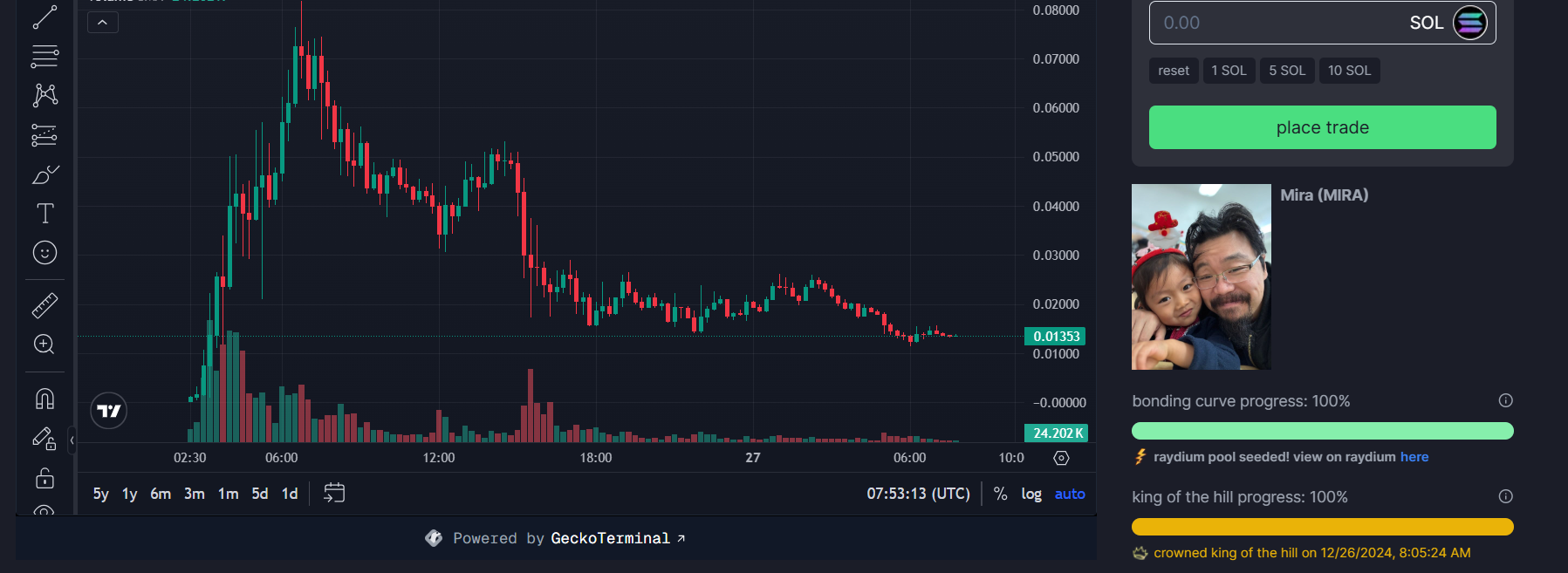Memecoin MIRA Surges to $80 Million Market Cap, Raises Over $1 Million for Cancer Research
A Pump.Fun memecoin, MIRA, achieved an $80 million market capitalization after a father's appeal for donations to fund research for his daughter's rare brain cancer attracted crypto traders. As of Friday, the token's price fell 80% from its peak, trading at just over one cent. Despite losses for late buyers, the effort raised over $1 million for the cause.
Siqi Chen, founder of the Runway corporate finance planning application, announced his daughter Mira's diagnosis in September, noting the lack of funding for research due to the rarity of her condition. His GoFundMe page has raised 80% of its $300,000 target, with all proceeds directed to research at the Hankinson Lab at the University of Colorado.
Chen shared his Ethereum wallet on social media and provided additional addresses upon request. This led to the creation of the MIRA token on Pump.fun, which allows users to issue tokens with minimal capital. When a token's market cap reaches $69,000, part of its liquidity is deposited into the Solana-based exchange Raydium and subsequently burned.

A user created the MIRA token featuring a picture of Chen and his daughter, without a clear objective beyond being a tradable memecoin. The creator's profile indicated that MIRA was one of several tokens launched that day, with none achieving significant market caps. Interest surged when user @Waddles_eth purchased 50% of the supply and transferred it to Chen, who then promoted the token on his account.
This promotion led to a rapid increase in value, peaking at 8 cents, elevating Chen's token holdings from $400,000 to over $18 million. MIRA's liquidity reached $7 million as trading volume exceeded $85 million across more than 130,000 transactions, making it the most popular small-cap token within 24 hours.
Chen remarked on the unprecedented nature of the event, stating he would liquidate $1,000 worth of MIRA every 10 minutes. He emphasized the fundraising success, regardless of token price fluctuations, aiming to raise at least $1 million for rare disease research.
The community response has been largely positive, with users highlighting the potential of memecoins for beneficial outcomes. While memecoins are often viewed skeptically by professional investors, they have gained traction compared to larger venture-backed crypto tokens, perceived as favoring wealthy investors over smaller retail traders.
MIRA's impact has shifted perceptions about memecoins. Users expressed newfound appreciation for their potential, with some stating that this instance exemplifies the purpose of cryptocurrency: facilitating asset movement for good causes. User @waddles_eth noted satisfaction with the outcome, expressing hope that the funds contribute to finding a cure for Mira and others with similar conditions.
Crypto for good initiatives may gain momentum in the coming year.
CORRECTION (Dec. 27, 09:06 UTC): The name of Chen's company was corrected to Runway; earlier versions referred to it as Runaway.